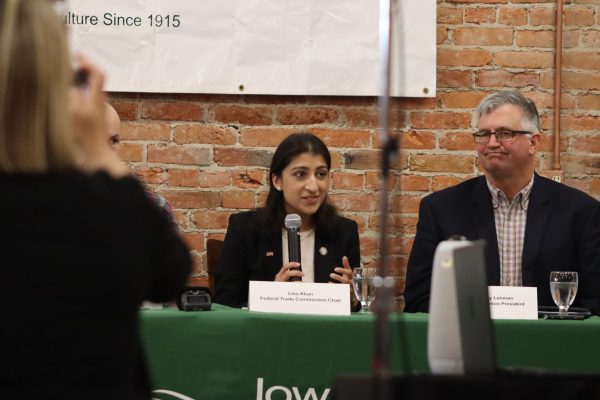Grade releases shed light on greek community
Photo: Karuna Ang/Iowa State Daily
Ashley Kruger, sophomore in construction engineering, reads for her ConE241 class on Tuesday at the Pi Beta Phi study room.
February 16, 2011
The average active greek chapter member GPA is higher than the all-university undergraduate GPA, according to the Office of Greek Affairs’ fall 2010 grade reports.
“Academics is the top priority for everyone in the greek community,” said Andrew McMurray, senior in biology and 2010 Inter-Fraternity Council scholarship vice president. “Every college student in all the chapters know how important it is to get good grades.”
The active greek member GPA was 3.04 and the ISU undergraduate university GPA was 2.94.
Greek Affairs works with Inter-Fraternity Council, Collegiate Panhellenic Council, National Pan-Hellenic Council and Multicultural Greek Council, as well as each house, to create strategies that will bring success to their chapter.
“A lot of what we do is work with scholarship chairs and provide resources,” McMurray said. “[Greek Affairs] also put together a handbook that chapters can use to better their programs and their effectiveness.”
All chapters must maintain a minimum 2.5 GPA to remain in good standing. Houses that do not meet this requirement risk probation.
The chapters with the highest GPAs for the fall 2010 semester included Acacia fraternity, Pi Beta Phi sorority, Zeta Phi Beta sorority and Delta Lambda Phi fraternity.
Chapters appoint a scholarship chairperson to ensure members focus on academics throughout the semester.
“Grades are really important because we want to show that being greek is a positive influence,” said Ashley Kruger, sophomore in construction engineering and scholarship chair for Pi Beta Phi sorority. “It also can be a great influence on everyone else.”
Pi Beta Phi has a grade incentive each semester, which helps motivate its chapter members get good grades, Kruger said.
“Whoever reports the most As and Bs, as well as those that record the most study hours in the library, will receive a prize,” Kruger said.
In addition to individual chapter success, the Inter-Fraternity Council received a national award that illuminates its efforts to help the greek community achieve academic success.
The Jellison Award, given by the Association of Fraternal Leadership and Values, “recognizes the Interfraternity Council with the highest percentage of achievement in eight programming categories,” according to the Association of Fraternal Leadership and Values news release.
Of the eight categories the AFLV judges on, academic achievement and leadership and educational development are two of them. McMurray said he worked hard during his time as scholarship chairman in order to help each chapter gain tips for success.
“We hold round table meetings to the scholarship chairs of each chapter, talking about programs they can do, such as time management and resume workshops,” McMurray said.
Chapters also may recognize individual members for their academic success during the semester.
“The program that we have right now is really working,” Kruger said. “My job is to recognize the girls in the house that have outstanding academic success, and to help those that aren’t doing so well to get them to the point where they can succeed.”

















